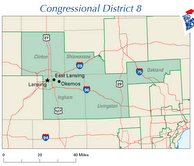A recent decision by the International Trade Commission to remove tariffs on foreign galvanized steel is expected to help the U.S. Auto industry, but it will deal a devastating blow to its former partner, the U.S. Steel industry.
Northeast Ohio, Pennsylvania and West Virginia are already suffering from the downturn in the steel industry, and the concession to its largest and most reliable customer is expected to devastate the region and lead to even more massive layoffs and job losses. So much for the Republican myth of the “one state recession.” Another GOP myth bites the dust.
An excellent report by the TV station WTOV in Steubenville, Ohio called “Steel vs. Wheels” really illustrated the problem of two former partners experiencing tough times. The report also features interviews with U.S. Rep. Mike Rogers, who basically blames the steel industry for not being able to compete with slave wages in China, the Philippines and other Third Worlds Countries.
As expected, automotive workers and their federal representatives cheered the ITC decision.
Rep. Mike Rogers, a four-term Republican who represents Lansing, the capital of the Big 3 Automakers home state of Michigan, said, "If you're going to have a robust steel producing industry, you have to have a robust steel consuming industry."
Rep. Rogers said Michigan has hemorrhaged jobs – tens of thousands of jobs – in recent years because of slumps in the domestic auto industry. The Congressman said the ruling will allow more automakers to move, or move back, to the U.S.
"When the tariffs were in place, automakers moved to foreign countries to produce their parts. Why? Because the steel was cheaper there," Rep. Rogers said. "Now those companies can move back to Michigan and still get their steel."
Rep. Rogers and his Georgia colleague, Republican Congressman Tom Price, both said the steel industry is partly to blame for its own difficulties.
Automakers and other industries say they need help with providing health care, and the cost of providing health care that foreign manufacturers have government help with adds as much or more to the price of the car than buying steel with a protective tariff does.
Perhaps the federal government, the Bush Administration and Rogers should be doing something that helps all U.S. manufacturers instead of pitting one against the other and picking winners and losers.
Subscribe to:
Post Comments (Atom)





No comments:
Post a Comment